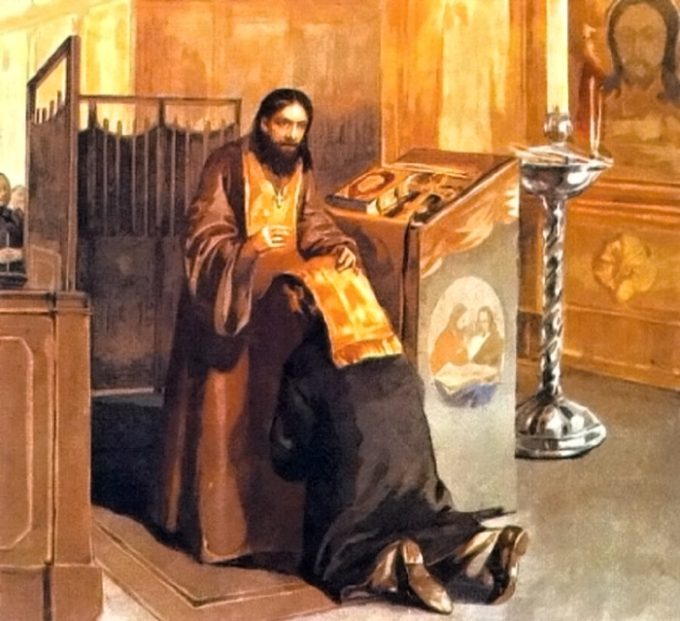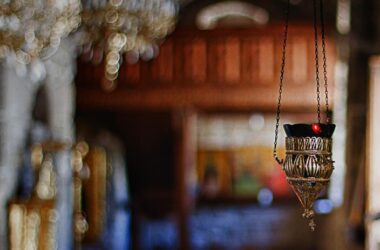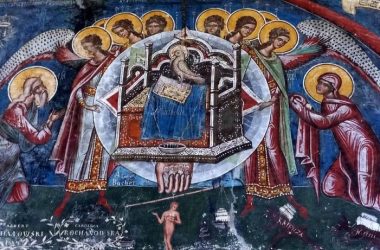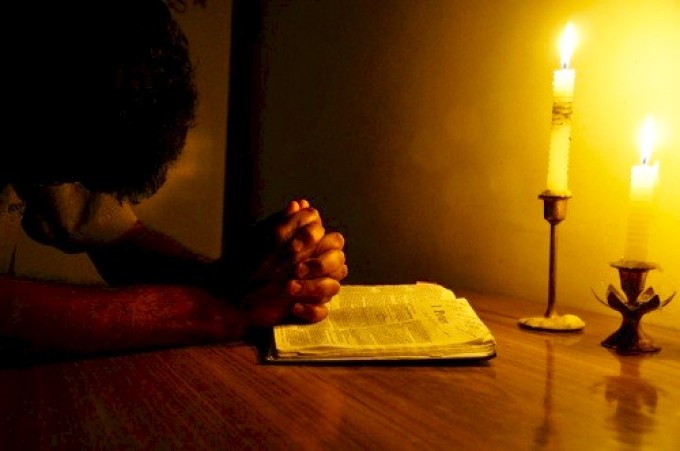Metropolitan Hierotheos Vlachos
Saint Nicodemus the Athonite writes: “heaven is a Persian word and has the meaning of a garden where are planted various kinds of tree…Therefore heaven, eternal life and the Kingdom of God are one and the same thing.
The term of hell (Kolasij) derives from the verb kolazo, which has two meanings: the first is `to remove the dry branches off the tree` and the scond meaning is `to punish`
In the Holy Scripture is mainly used the second meaning but not with the inference that God punishes the man but in the meaning that the man punishes himself, by not accepting the gift from God.
The common teaching of the Holy Fathers is that the heaven and the hell exist only from the human point of view and not from the divine point of view. It is true that the heaven and the hell exist as two distinct kinds of life, but it was not God who created that. In the patristic tradition it is obvious the fact that there aren’t two different places, but God himself is the heaven for the saints and He is the hell for the sinners.
We shall begin with saint Isaac the Syrian who explains to us what is heaven and what is hell. Speaking about heaven, the saint says that this represents God’s love. But referring at the hell, he says almost the same thing, the hell is the punishment of love. He writes: `And I say that those who are punished to hell are whipped with the lash of love – and what else can be more bitter and more terrible than the punishment of love? Therefore the hell represents the torment of God’s love. According to saint Isaac the pain caused in the soul by the sin committed against God’s love is more fierce than any other doom.
We feel unworthy and we doom ourselves when we don’t want to recognize someone’s love and stand against that. We feel awfully when we are loved and we don’t answer with love to that. If we make a parallel with God’s love for the men, we may understand the torment of hell. Regarding this saint Isaac adds that it would be a mistake to think that the sinners from the bottom of the hell are not given God’s love.
God sends his divine grace upon all, but the men shall receive it according to their power. God’s love will pour down upon all, but it shall have different results, punishing the sinners and blessing the worthy ones.
Thus the divine love and glory are the same for all, but each one shall receive them differently. What will this difference mean? God said to Moses: I will have mercy on whom will have mercy, and I will have compassion on whom will have compassion. (Exodus 33, 19). Saint Apostle Paul quoting this passage from the Old Testament says : So God has mercy on whom He wills to have and petrifies whomever He wants to. (Romans 9,18).
These passages must be interpreted from an Orthodox point of view. How is it possible that God has mercy on some and petrifies others? Is God partial? According to the interpretation given by the blessed Teophilact of Bulgaria, this does not depend on God but on the human nature. Saint Theophilact says:
`As the sun melts the wax of the candle but strengthens the clay, not at random, not by itself, but because of the difference between the wax and the clay, in the same way it is related that God petrified the heart of the pharaoh.`
Thus the divine glory, namely His love, shall pour down over all but will work in accordance with the spiritual level of each one.
Saint Gregory advises those to whom he speaks to study the teachings of the Church regarding the resurrection of the bodies, the Judgment and the reward of the good ones.
These things should be regarded in terms of fact that afterlife will be `the light of those who purified their thought` of course according to the level of purification of each one of them and they shall go to the Kingdom of heaven while the afterlife will be darkness for those whose souls are blind, the darkness being in reality the estrangement of God, in accordance with the degree of weakening from this life of the spiritual sight.
We can also analyze this difference from the point of view of the tangible reality. The same sun `brings light to the healthy sight but darkens the sick one.` It is not the sun who is guilty of that, but the eyes. At the Second Coming of Christ it will happen the same.
One is Christ `but He stands both for elevation and fall: fall for the unbelievers and elevation for the faithful.
Thus according to saint Gregory the Theologian, God himself is the heaven and the hell of men, since everyone lives the glory of God according with his own soul.
That is why in one of his doxologic texts, saint Gregory exclaims: Oh Holy Trinity to whom I became worthy to be worshipper and faithful preacher! Oh Holy Trinity, whom everybody will know one day – some for enlightment and others for punishment! God himself is light and hell for men. The words of the saint are clear and revealing.
I shall use only two examples for proving that what I said is a conception widely spread among the servants of the Church.
One of the examples is that of The Communion with the Body and Blood of Christ. The Holy Eucharist works in accordance with the spiritual condition of the man. If he is not pure, this burns him and if he fights to be purified or if he is sanctified, then it enlightens him. What it takes place now during the Holy Eucharist it shall take place as well during the Second Coming of Christ. For those who cleansed themselves or repented, God shall be heaven and He shall be hell for those who had not cleansed themselves.
The other example is taken from the Old Testament and represents the expression of the teaching of the Church.
Watching the iconography of the Second Coming of Christ as it is llustrated in the narthex of the monasteries, we can notice that the light surrounding the saints comes directly from the throne of God and from His throne as well it flows a fire stream that burns all the unrepentant sinners. Both the fire and the light spring from the very same place – and this thing illustrates very well the teachings of the Holy Fathers about the enlightening and burning power of the divine glory. This is closely related to the spiritual condition of the man.
- a) Heaven and hell represent the energy of the uncreated glory of God as it is experienced by men and as a result of this they are uncreated. Thus heaven and hell exist, but not in the form of the threatening and punishment, but in the form of sickness and healing. The righteous and the sinners shall see God in the afterlife but while the righteous shall rejoice in participating and living in God, the sinners shall not have the same privilege.
- b) Because the men live differently the divine glory in accordance with their spiritual condition, the cleanse is necessary from this lifetime.
Saint Gregory the Palamas underlines it: “Thus the man has to cleanse himself first then to receive salvation”.
- c) The hell does not represent the absence of God, as it is often said, it means to perceive the presence of God as a fire. And of course as we have already said in another chapter, we can already experience heaven and hell. Even more than this, I would say that the way in which we shall live the Second Coming of Christ depends on the way we perceive God in this life.
Elijah the Elder says that heaven as a spiritual disposition devoid of earthly emotions and pains is hidden in us and it is a form of the place where the righteous shall live. According to saint Gregory of Sinai, `the fire and the darkness, the worms and the hell are characterized by the collective passion of voluptuousness and the nescience of darkness and the pleasure of the laxity from all and the tremble and the impudent stench of the sin.`
Thus the passion of voluptuousness, the darkness and the tremble and the stench of the sin are the first experiences of hell and they are perceived even from now. All these things are already present and they represent the first signs of the torments of hell.
In another part of this chapter I saw more clearly the fact that the souls of men after they leave their bodies are either received by angels and go in heaven, or by devils and they go to hell.
Anyway neither the righteous nor the sinners receive completely the heaven or hell only foretaste from the joy of the righteous or from the torments of the sinners. Saint Mark the Eugenic says that the bliss and the joy of the saints either if we call it the view of God or the communion with Him or the Kingdom of God even if it is experienced in the moment of the separation of the soul from the body it is not complete without the expected reunion. It is not complete because the souls wait to be united with their bodies at the Second Coming of Christ so that they can be both glorified.
After it leaves the body, the soul waits for the Coming of Christ and for the Future Judgment, when it takes place the resurrection of the bodies but it lives from now the condition it deserves according to its deeds, finding themselves in different places which must be understood as different ways of life. Saint Mark the Eugenic says that `the righteous and the sinners are in places suitable for themselves.` The righteous lead a free and careless life in heaven with the angels and with God in the heaven from where Adam had fallen while the sinners are in hell and they live in torments and uncaressed pains like the convicted who wait for the decision of the judge. Neither the righteous nor the sinners will gain completely the Kingdom of God or the hell. Thus we notice that there is a distinction between heaven and the kingdom of God and between hell and the eternal Gheena. The righteous enter the heaven after they die and wait for the entrance into the Kingdom of God after the resurrection of their bodies. And the sinful enter the hell after their death and they shall enter the eternal Gheena after the resurrection of their bodies and the Doomsday.
As we have said before after the separation from body the souls of the sinners who don’t repent for their deeds go to hell which differs from the eternal Gheena. The hell represents a preparation for the eternal torments. We might call it the antechamber where the souls remain like some doomed ones who wait for the judgment.
Saint Gregory of Nyssa says that we must not think that the hell is a certain place but an unseen, unbodily disposition of the soul. When we speak about hell we refer at nothing else but at the resettlement of the soul in the unseen. Saint Nikita Stethatos uses the word hell with this meaning – of obscure dark place – for describing a jail. If the soul had not been healed while still being in its body after separating from it suffers a lot because of the passions and it doesn’t feel any comfort or solace and cannot partake with the Light and the divine and this represents a dark tormenting experience, a torture. This is called hell.
By contrast, after they leave this life, the righteous live in heaven in bliss. In other words they commune with the enlightening and with the divinity. Saint Nikita Stethatos says that the souls of the saints which are pure and with good fragrance with divine likeness and full of the glory and the purest light of God when they separate of their bodies they shine like the sun due to their good deeds of wisdom and purity. These souls are accompanied by friendly angels towards the First Light. The First Light is the Triune God, the Holy Trinity, the angels are lights of second rank and the righteous commune with the First Light.






